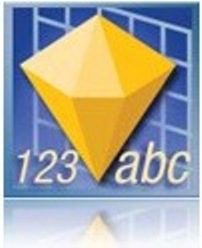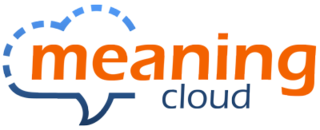Related Research Articles
Text mining, text data mining (TDM) or text analytics is the process of deriving high-quality information from text. It involves "the discovery by computer of new, previously unknown information, by automatically extracting information from different written resources." Written resources may include websites, books, emails, reviews, and articles. High-quality information is typically obtained by devising patterns and trends by means such as statistical pattern learning. According to Hotho et al. (2005) we can distinguish between three different perspectives of text mining: information extraction, data mining, and a knowledge discovery in databases (KDD) process. Text mining usually involves the process of structuring the input text, deriving patterns within the structured data, and finally evaluation and interpretation of the output. 'High quality' in text mining usually refers to some combination of relevance, novelty, and interest. Typical text mining tasks include text categorization, text clustering, concept/entity extraction, production of granular taxonomies, sentiment analysis, document summarization, and entity relation modeling.
Information extraction (IE) is the task of automatically extracting structured information from unstructured and/or semi-structured machine-readable documents and other electronically represented sources. Typically, this involves processing human language texts by means of natural language processing (NLP). Recent activities in multimedia document processing like automatic annotation and content extraction out of images/audio/video/documents could be seen as information extraction.
UIMA, short for Unstructured Information Management Architecture, is an OASIS standard for content analytics, originally developed at IBM. It provides a component software architecture for the development, discovery, composition, and deployment of multi-modal analytics for the analysis of unstructured information and integration with search technologies.
Unstructured data is information that either does not have a pre-defined data model or is not organized in a pre-defined manner. Unstructured information is typically text-heavy, but may contain data such as dates, numbers, and facts as well. This results in irregularities and ambiguities that make it difficult to understand using traditional programs as compared to data stored in fielded form in databases or annotated in documents.
BasisTech is a software company specializing in applying artificial intelligence techniques to understanding documents and unstructured data written in different languages. It has headquarters in Somerville, Massachusetts with a subsidiary office in Tokyo. Its legal name is BasisTech LLC.

General Architecture for Text Engineering or GATE is a Java suite of tools originally developed at the University of Sheffield beginning in 1995 and now used worldwide by a wide community of scientists, companies, teachers and students for many natural language processing tasks, including information extraction in many languages.
LanguageWare is a natural language processing (NLP) technology developed by IBM, which allows applications to process natural language text. It comprises a set of Java libraries which provide a range of NLP functions: language identification, text segmentation/tokenization, normalization, entity and relationship extraction, and semantic analysis and disambiguation. The analysis engine uses Finite State Machine approach at multiple levels, which aids its performance characteristics, while maintaining a reasonably small footprint.

IBM SPSS Modeler is a data mining and text analytics software application from IBM. It is used to build predictive models and conduct other analytic tasks. It has a visual interface which allows users to leverage statistical and data mining algorithms without programming.
The Ubiquitous Knowledge Processing Lab is a research lab at the Department of Computer Science at the Technische Universität Darmstadt. It was founded in 2006 by Iryna Gurevych.
Lexalytics, Inc. provides sentiment and intent analysis to an array of companies using SaaS and cloud based technology. Salience 6, the engine behind Lexalytics, was built as an on-premises, multi-lingual text analysis engine. It is leased to other companies who use it to power filtering and reputation management programs. In July, 2015 Lexalytics acquired Semantria to be used as a cloud option for its technology. In September, 2021 Lexalytics was acquired by CX company InMoment.
Knowledge extraction is the creation of knowledge from structured and unstructured sources. The resulting knowledge needs to be in a machine-readable and machine-interpretable format and must represent knowledge in a manner that facilitates inferencing. Although it is methodically similar to information extraction (NLP) and ETL, the main criterion is that the extraction result goes beyond the creation of structured information or the transformation into a relational schema. It requires either the reuse of existing formal knowledge or the generation of a schema based on the source data.

Apache cTAKES: clinical Text Analysis and Knowledge Extraction System is an open-source Natural Language Processing (NLP) system that extracts clinical information from electronic health record unstructured text. It processes clinical notes, identifying types of clinical named entities — drugs, diseases/disorders, signs/symptoms, anatomical sites and procedures. Each named entity has attributes for the text span, the ontology mapping code, context, and negated/not negated.
The following outline is provided as an overview of and topical guide to natural-language processing:
NetOwl is a suite of multilingual text and identity analytics products that analyze big data in the form of text data – reports, web, social media, etc. – as well as structured entity data about people, organizations, places, and things.

MeaningCloud is a Software as a Service product that enables users to embed text analytics and semantic processing in any application or system. It was previously branded as Textalytics.
Linguamatics, headquartered in Cambridge, England, with offices in the United States and UK, is a provider of text mining systems through software licensing and services, primarily for pharmaceutical and healthcare applications. Founded in 2001, the company was purchased by IQVIA in January 2019.
Spark NLP is an open-source text processing library for advanced natural language processing for the Python, Java and Scala programming languages. The library is built on top of Apache Spark and its Spark ML library.
References
- ↑ "Text Analytics Toolbox". mathworks.com. Retrieved 2019-07-10.
- ↑ "Text analysis with Sketch Engine". Sketch Engine. LEXICAL COMPUTING CZ s.r.o. 14 December 2017. Retrieved 17 January 2018.
- ↑ "Table of Contents: Text Mining". PLOS Collections. doi: 10.1371/issue.pcol.v01.i14 (inactive 31 January 2024). Archived from the original on 2013-07-04. Retrieved 2014-02-20.
{{cite journal}}: CS1 maint: DOI inactive as of January 2024 (link) - ↑ "Introduction to the tm Package: Text Mining in R" (PDF).
- ↑ Wild, Fridolin (February 20, 2020). "CRAN Task View: Natural Language Processing". CRAN.R Project.